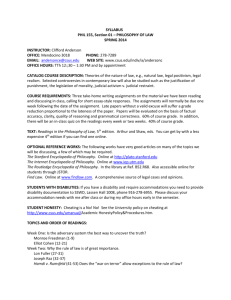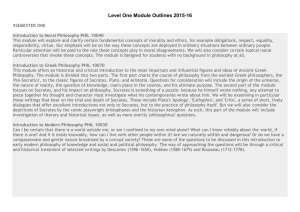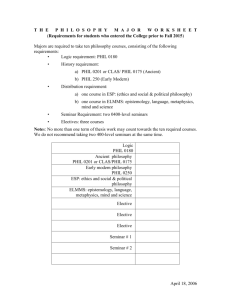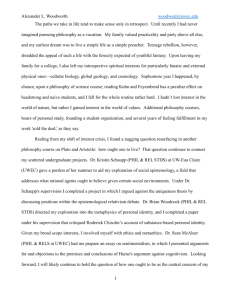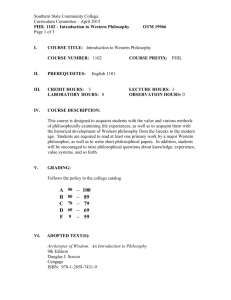Sample Syllabus - Department of Philosophy
advertisement
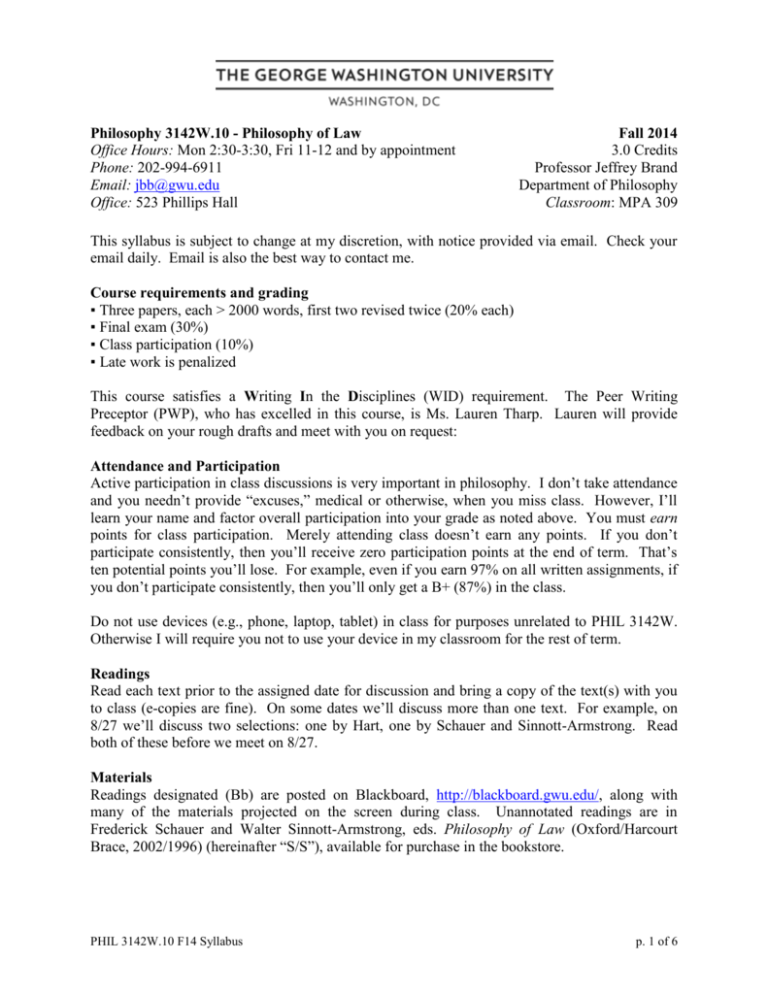
Philosophy 3142W.10 - Philosophy of Law Office Hours: Mon 2:30-3:30, Fri 11-12 and by appointment Phone: 202-994-6911 Email: jbb@gwu.edu Office: 523 Phillips Hall Fall 2014 3.0 Credits Professor Jeffrey Brand Department of Philosophy Classroom: MPA 309 This syllabus is subject to change at my discretion, with notice provided via email. Check your email daily. Email is also the best way to contact me. Course requirements and grading ▪ Three papers, each > 2000 words, first two revised twice (20% each) ▪ Final exam (30%) ▪ Class participation (10%) ▪ Late work is penalized This course satisfies a Writing In the Disciplines (WID) requirement. The Peer Writing Preceptor (PWP), who has excelled in this course, is Ms. Lauren Tharp. Lauren will provide feedback on your rough drafts and meet with you on request: Attendance and Participation Active participation in class discussions is very important in philosophy. I don’t take attendance and you needn’t provide “excuses,” medical or otherwise, when you miss class. However, I’ll learn your name and factor overall participation into your grade as noted above. You must earn points for class participation. Merely attending class doesn’t earn any points. If you don’t participate consistently, then you’ll receive zero participation points at the end of term. That’s ten potential points you’ll lose. For example, even if you earn 97% on all written assignments, if you don’t participate consistently, then you’ll only get a B+ (87%) in the class. Do not use devices (e.g., phone, laptop, tablet) in class for purposes unrelated to PHIL 3142W. Otherwise I will require you not to use your device in my classroom for the rest of term. Readings Read each text prior to the assigned date for discussion and bring a copy of the text(s) with you to class (e-copies are fine). On some dates we’ll discuss more than one text. For example, on 8/27 we’ll discuss two selections: one by Hart, one by Schauer and Sinnott-Armstrong. Read both of these before we meet on 8/27. Materials Readings designated (Bb) are posted on Blackboard, http://blackboard.gwu.edu/, along with many of the materials projected on the screen during class. Unannotated readings are in Frederick Schauer and Walter Sinnott-Armstrong, eds. Philosophy of Law (Oxford/Harcourt Brace, 2002/1996) (hereinafter “S/S”), available for purchase in the bookstore. PHIL 3142W.10 F14 Syllabus p. 1 of 6 Outside Research and Websites I don’t expect or encourage students to conduct outside research when writing their papers. I want to see what you can do with the assigned materials and your own intellect. If you have a question about a matter of law or philosophy, then ask me. It’s especially unacceptable to cite websites when more reliable sources are available. Do not, for example, Google “death penalty” and cite the resulting links to support your argument. Goals and Learning Outcomes This course introduces Western legal philosophy, emphasizing the twentieth century. Although the instructor is a licensed attorney as well as a philosophy professor, this is not a “pre-law” course. It’s a course in academic philosophy. Legal philosophers ask questions such as following. What purposes do legal systems serve? What are the essential features of a legal system? Who creates the law? Who should create it? Are judges entitled to make law, or does that job belong exclusively to legislators? What are the sources of law? What kinds of standards are included in the set of legal standards? What reasons do we have to obey the law? When, if ever, are we morally obligated to obey? What reasons do public officials, such as judges, have to apply the law? When, if ever, are they morally obligated to apply it? Is there any legal question that has a unique, legally correct answer? Does every legal question have a unique, legally correct answer? How does one discover the legally correct answer to a legal question? To what, if anything, does legal discourse refer? How should judges use legal precedent? How is law related to justice, ethics, and morality? What is the “rule of law” and what does it require? In this course, we’ll also examine specific bodies of law, such as criminal law, constitutional law, and the law of torts (wrongful harms). We’ll ask what underlying rationales we can identify with respect to these areas. Finally, we’ll debate the values that public officials (e.g., judges, executives, and legislators) should implement when they make and apply law. What moral principles and policies should our penal system reflect? Did the U.S. Supreme Court make a mistake when it upheld the death penalty? Was it wrong to uphold affirmative action in higher education? Was it correct to recognize constitutional rights to abortion and sodomy? As you attempt to answer these difficult questions, you should acquire skills in interpreting legal-philosophical arguments. You should improve your ability to defend your views against criticism, and to express yourself, both verbally and in writing, with precision, clarity, and economy. You’ll be expected to appreciate the merits of opposing viewpoints, to tolerate ambiguity and confusion, and to treat one another with respect. At the end of this course students should be able to: 1. Recall, articulate, and discuss some basic questions of legal philosophy; 2. Interpret basic legal-philosophical texts and summarize the arguments presented; 3. Compare and contrast legal-philosophical positions; 4. Evaluate and criticize arguments; 5. Construct simple arguments. Learning Outcomes This course fulfills one of the analytical approaches required in the General Education Curriculum of the University: Critical Thinking. Critical Thinking involves analyzing and evaluating abstract information; understanding and analyzing scholarly literature and argument; and formulating logical arguments based on that analysis. This course requires students to demonstrate these skills in the following ways: PHIL 3142W.10 F14 Syllabus p. 2 of 6 1. Analyzing and evaluating abstract information ▪ Students are required to analyze and evaluate legal systems, bodies of legal doctrine, and theoretical frameworks for understanding these systems and doctrines. 2. Understanding and analyzing scholarly literature and argument, particularly with respect to theoretical orientation and sources of support ▪ Students are required to interpret classic and contemporary legal-philosophical texts, and to engage critically with them. Required texts include both primary and secondary literatures and represent a range of contrasting legal-philosophical positions and schools of thought. Students must demonstrate comprehension of the arguments presented therein in class discussions and in written work. ▪ Students are required to evaluate and criticize arguments for theoretical positions and for prescriptive claims about modern legal systems. 3. Formulating logical arguments based on their analyses ▪ Students are required to construct logical arguments of their own, building upon and reacting to their analyses of arguments in the scholarly literature of legal philosophy. The instructor assesses student development of these skills by three means: 1) an in-class, essayformat final examination; 2) three analytical essays on pre-assigned topics; and 3) verbal queries from the instructor during every class meeting. Academic Integrity All examinations, papers, and other graded work products and assignments are to be completed in conformance with The George Washington University Code of Academic Integrity. It states, in part, “Academic dishonesty is defined as cheating of any kind, including misrepresenting one’s own work, taking credit for the work of others without crediting them and without appropriate authorization, and the fabrication of information.” For the remainder of the code, see: http://www.gwu.edu/~ntegrity/code.html Support for Students Outside the Classroom Disability Support Services (DSS) Any student who may need an accommodation based on the potential impact of a disability should contact the DSS office at 202-994-8250 in Rome Hall, Suite 102, to establish eligibility and to coordinate reasonable accommodations. For additional information please refer to: http://gwired.gwu.edu/dss/ University Counseling Center (UCC) 202-994-5300 The UCC offers 24/7 assistance and referral to address students’ personal, social, career, and study skills problems. Services for students include: - crisis and emergency mental health consultations - confidential assessment, counseling services (individual and small group), and referrals http://gwired.gwu.edu/counsel/CounselingServices/AcademicSupportServices Security In the cases of an emergency, if at all possible, the class should shelter in place. If the building in which the class is held is affected, follow the evacuation procedures for the building. After evacuation, seek shelter at a predetermined rendezvous location. PHIL 3142W.10 F14 Syllabus p. 3 of 6 Schedule 8/25 8/29 9/5 9/8 9/12 9/15 9/19 9/22 9/26 9/29 10/3 Introduction The Many Questions of Legal Philosophy The Essential Features of a Legal System S/S, “Legal Positivism” (pp. 29-32) H.L.A. Hart, from The Concept of Law (pp. 40-49) The Rule of Law Lon Fuller, from The Morality of Law (pp. 18-27) The Duty to Obey the Law S/S, “The Moral Force of Law”; “Is There a Moral Obligation to Obey the Law?” (pp. 219-31) John Rawls, “Legal Obligation and the Duty of Fair Play” only §§4-8 (pp. 234-39) First paper topics posted on Blackboard (Bb) A.J. Simmons, “The Principle of Fair Play” (pp. 240-48) Unjust Positive Law S/S, “The Theory of Natural Law” (pp. 8-11) Thomas Aquinas, from Summa Theologiae (pp. 12-14) Anthony D’Amato, “On the Connection Between Law and Justice” (Bb) Mark C. Murphy, “Natural Law Jurisprudence” (Bb) Legal Indeterminacy and Judicial Obligation S/S, “Legal Realism and Critical Legal Studies” (pp. 50-53) S/S, Karl Llewellyn, from The Common Law Tradition (just p. 58) Oliver Wendell Holmes, Jr., from The Path of the Law (Bb) Jerome Frank, from Law and the Modern Mind (Bb) Submit first draft of first paper on Bb Duncan Kennedy, “Freedom and Constraint in Adjudication: A Critical Phenomenology” (pp. 62-69) Rules, Principles, and Policies S/S, “Ronald Dworkin and Law as Integrity” (pp. 70-73) Ronald Dworkin, from Taking Rights Seriously (pp. 74-89) PWP returns first draft of first paper Ronald Dworkin, from Law’s Empire (pp. 90-100) PHIL 3142W.10 F14 Syllabus p. 4 of 6 10/6 Justifications for Punishment S/S, “Punishment”; “The Nature of Punishment”; “Theories of Punishment”; “Utilitarian Theories of Punishment” (pp. 659-74) Jeremy Bentham, from Introduction to the Principles of Morals and Legislation (pp. 67482) Submit second draft of first paper on Bb 10/10 Second paper topics posted on Bb 10/13 S/S, “Retributivisms” (pp. 691-701) Michael S. Moore, “The Moral Worth of Retribution” (Bb) PWP returns second draft of first paper 10/17 Michael Davis, “Harm and Retribution” (pp. 705-15) Submit final draft of first paper on Bb Capital Punishment 10/20 S/S, “Capital Punishment” (pp. 720-30) Ernest van den Haag, “The Collapse of the Case Against Capital Punishment” (pp. 73144) Jeffrey Reiman, “Justice, Civilization, and the Death Penalty” (pp. 744-50) 10/24 Furman v. Georgia (pp. 761-65) Gregg v. Georgia (pp. 765-69) Submit first draft of second paper on Bb 10/27 Stephen Nathanson, “Does it Matter if the Death Penalty is Arbitrarily Administered?” (pp. 750-60) McCleskey v. Kemp (pp. 769-75) Causation, Responsibility, and Mental States 10/31 S/S, “Responsibility”; “What is Responsibility?”; “Legal Causation” (pp. 783-93) H.L.A. Hart and Tony Honoré, from Causation in the Law (pp. 793-804) S/S, Question #6 (p. 804) 11/3 Larry Alexander and Kimberly Kessler Ferzan, from Crime and Culpability (Bb) PWP returns first draft of second paper 11/7 S/S, “Responsibility for Omissions” (pp. 815-26) Richard A. Epstein, “A Theory of Strict Liability” (pp. 826-34) Ernest Weinrib, “The Case for a Duty to Rescue” (pp. 834-42) 11/10 S/S, “Mens Rea and Strict Liability” (pp. 846-56) Richard A. Wasserstrom, “Strict Liability in the Criminal Law” (pp. 856-65) Submit second draft of second paper on Bb PHIL 3142W.10 F14 Syllabus p. 5 of 6 Constitutional Interpretation 11/14 Robert Bork, “Neutral Principles and Some First Amendment Problems” (pp. 416-21) Robert Bork, The Tempting of America (pp. 132-136) Stephen Macedo, “Originalism and the Inescapability of Politics” (Bb) Third paper topics posted on Bb Sexual Conduct 11/17 Griswold v. Connecticut (pp. 404-12) Lawrence v. Texas (Bb) PWP returns second draft of second paper Abortion 11/21 Roe v. Wade (pp. 422-28) Planned Parenthood of Southeastern Pennsylvania v. Casey (pp. 437-42) Submit final draft of second paper on Bb 11/24 Donald H. Regan, “Rewriting Roe v. Wade” (Bb) 12/1 12/5 Affirmative Action Ronald Dworkin, "Why Bakke Has No Case" (pp. 572-80) Grutter v. Bollinger (Bb) Submit final draft of third paper on Bb Review session for final examination 12/12 Final exam: tenatively scheduled from 10:20am-12:20pm, final date and time to be announced by Office of the Registrar In accordance with University policy, the final exam will be given during the final exam period (December 10-18) and not during the last week of the semester. PHIL 3142W.10 F14 Syllabus p. 6 of 6
